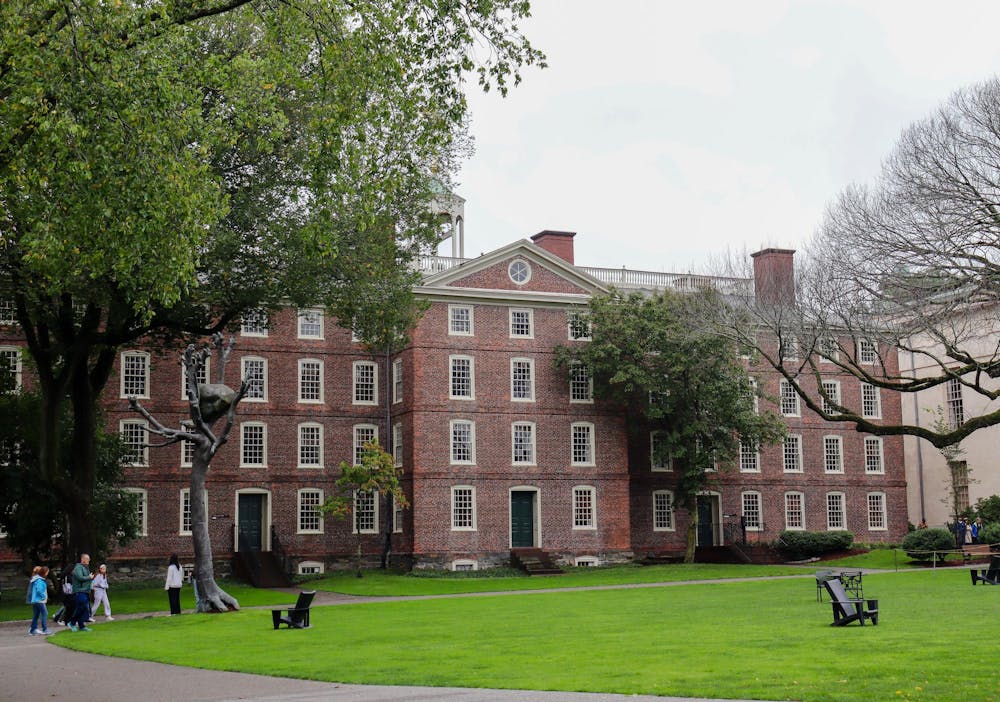On Nov. 8, 20 student demonstrators with BrownU Jews for Ceasefire Now were arrested and charged with willful trespass for remaining in University Hall after the building had closed to the public, The Herald previously reported. The students had staged a sit-in at University Hall, calling on President Christina Paxson P’19 P’MD’20 to support a divestment of the University’s endowment from “companies that enable war crimes in Gaza.”
In a statement to The Herald, University Spokesperson Brian Clark wrote that the students’ presence in University Hall after normal operating hours posed “security concerns.”
The Herald spoke with two senior administrators about the University’s response to the sit-in and subsequent student arrests.
According to Senior Vice President for Communications Cass Cliatt, University Hall does not have the “facilities” or “security” for overnight stays. The building also houses offices containing confidential information, such as the Office of the General Counsel.
The University’s code of conduct states that “the time, place and manner” in which community members exercise their freedom of expression on campus “shall be subject to reasonable regulation only to prevent interference with the normal functions of the University.”
According to Cliatt, the University believes that its policies do not limit the right to free expression or protest on campus. “I see policies as guidelines,” Cliatt said. “They are resources for the community for understanding responsibilities and standards of behavior.”
Vice President for Campus Life Eric Estes, who was one of several administrators who engaged with the student protestors during the sit-in, said administrators were focused on ensuring that the “students (were) fully informed as they (made) their choices.”
“There have been students in the past who were arrested and made choices to remain in a space. That is sometimes a choice in activism as well,” Cliatt said. “For some activists, it is a form (of) — or another step in — their expression.”
Estes noted that all decisions concerning the sit-in were made in consultation with the University’s senior leadership, including Paxson and Provost Francis Doyle, who were away from campus on Nov. 8.
The students who participated in the sit-in now await a Nov. 28 court date on charges of willful trespass and may face disciplinary proceedings from the University, The Herald previously reported. Cliatt and Estes declined to comment on the specifics of such disciplinary proceedings and the administrative support offered to the arrested students.
“We’re going to work really hard to make sure we’re in a position to try and support them the best that we can,” Estes said of the arrested students.
As of Nov. 15, student representatives from Jews for Ceasefire Now had not received any communication from the University administration related to the arrests, The Herald previously reported.
Throughout the sit-in, Cliatt said the University’s priority “was to make sure that the students felt supported, and they will continue to be supported throughout this process.”
She also pointed to the University’s efforts to support the Brown community as activism surrounding the Oct. 7 Hamas attack on southern Israel and Israel’s ongoing military retaliation in Gaza continues.
“No matter where we go, no matter how this evolves, our priority is the well-being of the community,” Cliatt said. “We are working very hard to ensure that, as people disagree, as they strongly disagree, as they hold different views, as they experience this in different ways … that we can get through this as a community.”
In regards to JFCN’s demands that Paxson publicly support divestment, Cliatt said Brown will not take an action that expresses a view on a political issue. She added that such an action would conflict with the University’s mission to foster a community in which members can freely express and exchange ideas.
“Brown is not an individual or a person with political ideologies, thoughts, views, lived experiences — Brown is a community of all of those things,” Cliatt said. “And so it is appropriate for us as an institution to celebrate that diversity of views and viewpoints by not citing one or an individual of them, but by celebrating their right to express them.”
Brown taking a position as an institution would “silence members of our community,” she added.

Sam Levine is a University News editor from Brooklyn, New York covering on-campus activism. He is a senior concentrating in International and Public Affairs.





